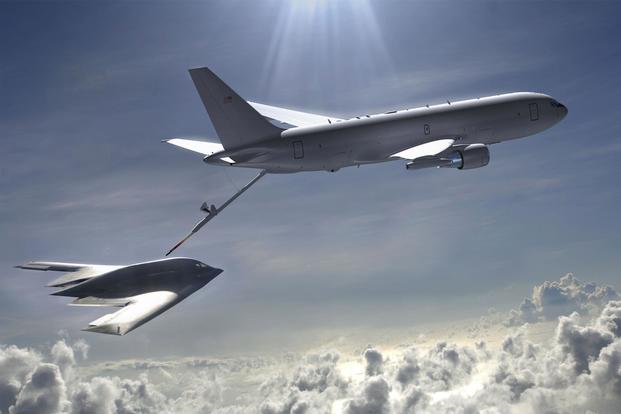The U.S. Air Force has stopped accepting deliveries of its brand-new KC-46 Pegasus tanker only weeks after the first aircraft was transported from manufacturer Boeing Co.'s Washington state facility to McConnell Air Force Base, Kansas.
The Defense Contract Management Agency (DCMA) halted deliveries Feb. 20 because of foreign object debris found in the aircraft, Air Force spokeswoman Maj. Malinda Singleton said Friday. The Seattle Times first reported that the debris, which could damage the aircraft, led to a week-long grounding of the tankers and safety concerns from top service officials.
"The Air Force takes Foreign Object Debris (FOD) contamination very seriously," Singleton said in a statement. "The combined Air Force, Defense Contract Management Agency and Boeing team is working together to resolve these concerns as safely and quickly as possible."
The Air Force will not accept deliveries of the tanker until the production aircraft are cleared, and the service and DCMA have approved a corrective action plan by Boeing "that will prevent FOD in the future," she said.
Related content:
- Loose Tools, Debris Left During Manufacturing Led to Grounding of KC-46 Tankers
- Air Force to Accept KC-46 Tanker Deliveries Despite Lingering Problems
- Will Ongoing KC-46 Tanker Problems Affect KC-10 Retirement?
The Air Force took its first delivery of the tanker at McConnell on Jan. 25. According to the Seattle Times, Boeing has delivered six tankers total to McConnell and Altus Air Force Base, Oklahoma. Another delivery was scheduled for Friday.
Roughly 45 more production tankers remain at Boeing in the final stages of completion, the paper said.
According to a management memo from Boeing's factory managers obtained by the Seattle Times, eight tools were found in aircraft delivered to the Military Delivery Center (MDC) at Paine Field, about 25 miles north of Seattle. The MDC approves and completes the aircraft.
All aircraft under construction are supposed to be swept routinely for debris. Loose objects are dangerous because they can cause damage over time.
The MDC declared a "level 3" alert on the assembly line. "Does anyone know what a level four is?" the management memo said, according to the paper’s report. "A level four ... will shut down our factory. This is a big deal."
The Pegasus already had problems.
The Air Force announced last month that it would accept the tanker, based on the 767 airliner, despite the fact it still has deficiencies that Boeing has agreed to fix after delivery.
"We have identified, and Boeing has agreed to fix at its expense, deficiencies discovered in developmental testing of the remote vision system [RVS]," Air Force spokeswoman Capt. Hope Cronin said last month.
The RVS, which is made by Rockwell Collins and permits the in-flight operator to view the refueling system below the tanker, has been subject to frequent software glitches. The first tankers will be delivered despite that problem. The systemic issue, which will require a software and hardware update, may take three to four years to fix, Cronin told Defense News last month.
"The Air Force has mechanisms in place to ensure Boeing meets its contractual obligations while we continue with initial operational testing and evaluation," she said.
The company has contracted for 52 of the 179 tankers the Air Force intends to buy. Boeing is responsible for any cost overruns, which had climbed to $3.5 billion as of October, the company said.
The service awarded Boeing a fixed-price, $4.9 billion contract in 2011. The company was supposed to deliver the initial 18 aerial refueling planes by August 2017.
But with ongoing issues throughout the program since its start in 2013, including design problems in the refueling boom, Boeing and Air Force officials pushed the first delivery to February 2018.
Last March, the service announced that "predicted impacts associated with airworthiness certifications and slower-than-expected flight test execution" would delay delivery to the "latter part of 2018."
Then, former Defense Secretary Jim Mattis' unexpected exit in December presented yet another problem.
Sources told Defense News and Reuters that Mattis' signature was required to finalize delivery plans. But President Donald Trump's announcement that Mattis would leave by the end of 2018 instead of his planned departure in February caused another delay for the program.
The KC-46 is meant to replace older tanker fleets, such as the KC-135 Stratotanker and KC-10 Extender. The total current inventory of KC-10s and KC-135s sits at 455 aircraft.
The Air Force plans to retire part of its legacy aerial refueling fleet and meet its 479-tanker total force requirement with a mix of KC-46s and KC-135s in the future.
All three tankers are manufactured or have been upgraded by Boeing.
-- Oriana Pawlyk can be reached at oriana.pawlyk@military.com. Follow her on Twitter at @Oriana0214.










